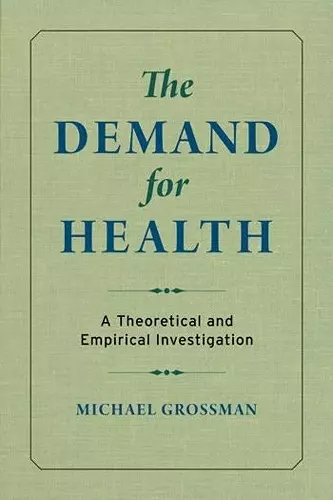The Demand for Health
A Theoretical and Empirical Investigation
Format:Hardback
Publisher:Columbia University Press
Published:1st Sep '17
Currently unavailable, and unfortunately no date known when it will be back

A seminal work in health economics, Michael Grossman's The Demand for Health introduced a new theoretical model for determining the health status of the population when first published in 1972. His work uniquely synthesized economic and public health knowledge and catalyzed a vastly influential body of health economics literature. It is well past time to bring this important work back into print. Grossman bases his approach on Gary S. Becker's household production function model and his theory of investment in human capital. Consumers demand health, which can include illness-free days in a given year or life expectancy, and then produce it through the input of medical care services, diet, other market goods and services, and time. Grossman also treats health and knowledge as equal parts of the durable stock of human capital. Consumers therefore have an incentive to invest in health to increase their earnings in the future. From here, Grossman examines complementarities between health capital and other forms of human capital, the most important of which is knowledge capital earned through schooling and its effect on the efficiency of production. He concludes that the rate of return on investing in health by increasing education may exceed the rate of return on investing in health through greater medical care. Higher income may not lead to better health outcomes, as wealth enables the consumption of goods and services with adverse health effects. These are some of the major revelations of Grossman's model, findings that have great relevance as we struggle to understand the links between poverty, education, structural disadvantages, and health.
A most remarkable study, which ranks among the very most important and pioneering ones in health economics. -- Gary S. Becker A seminal work in health economics, which led to a major stream of literature dealing with the determinants of the health status of the population. -- Joseph Newhouse, Harvard University Grossman's The Demand for Health did for health economics what Gary Becker's Human Capital did for labor economics by describing the broad, integrative power of human capital theory. -- Robert Michael, University of Chicago The Demand for Health revolutionized economists' theorizing about health. -- Arleen A. Leibowitz, University of California, Los Angeles The Demand for Health quickly had a major impact on health economics and has continued to inspire streams of research ever since. -- Victor Fuchs, Stanford University A pathbreaking work on the demand for health, the production of health, and health capital. -- John Mullahy, University of Wisconsin An elegant study in the tradition of Becker, using micro-economic methods to explore an area of non firm capital formation, and then ingeniously exploiting survey data to test some interesting theoretical propositions. -- J. D. Pole Journal of the Royal Statistical Society A ground breaking work which has produced a model that is theoretically sound, intuitively appealing, and yields significantly testable implications. -- Ronald Anderson The Journal of Economic Literature Grossman's theoretical model, which is a major innovation, treats the demand for health (and the derived demand for medical care) as determined in the context of a life-cycle model of human capital investment. -- David Salkever American Journal of Agricultural Economics
ISBN: 9780231179003
Dimensions: unknown
Weight: unknown
216 pages